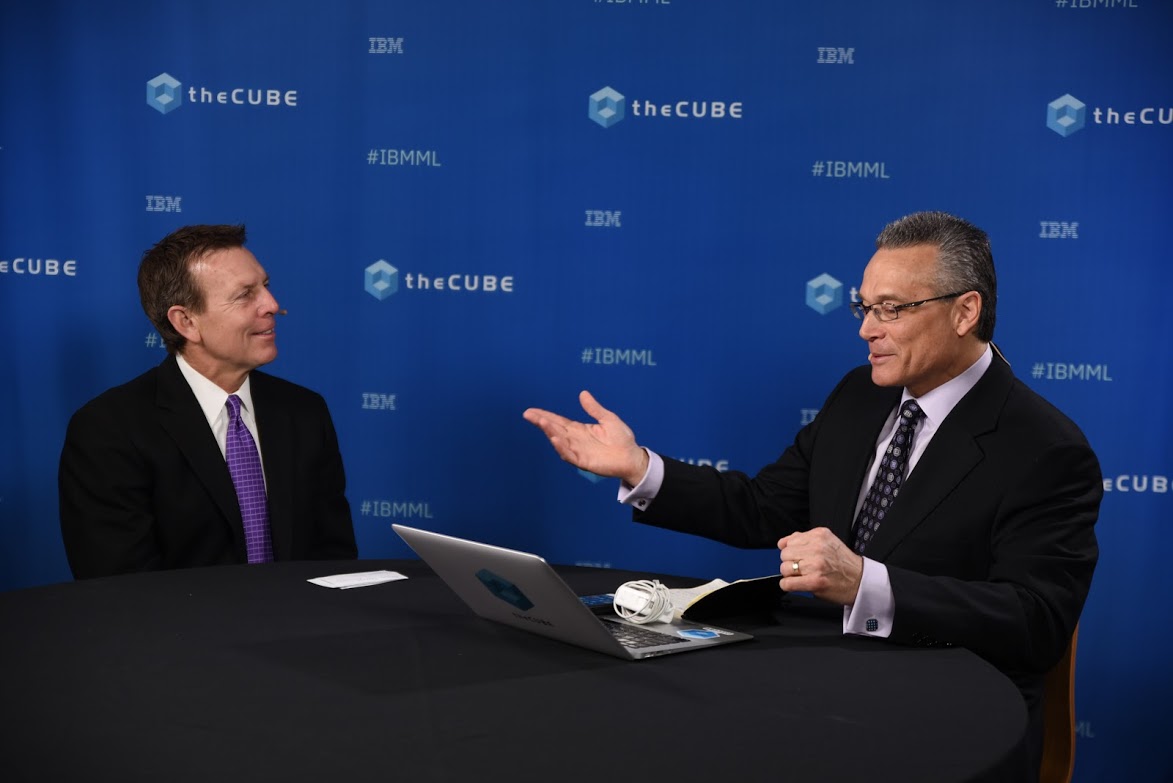 BIG DATA
BIG DATA
 BIG DATA
BIG DATA
 BIG DATA
BIG DATA
Artificial intelligence — what is it good for? Can we pierce the colorful veil of hype and hurrah over AI and spy what real business and social benefits it will bring us?
“At the end of the day, the question is: Is the world going to be a better place with all this AI?” said Dave Vellante (@dvellante, pictured, right), co-host of theCUBE, SiliconANGLE Media’s mobile livestreaming studio. “Are we going to be more prosperous, more productive, healthier, safer on the roads? I am an optimist; I come down on the side of yes. I would not want to go back to the days where I didn’t have GPS.”
AI is a double-edged sword, however. Will it shrink the digital-capital gap between traditional and digital-native companies or widen it? Will it strengthen the tech oligopoly lording over the internet or give citizen developers the rumbling might to topple it?
Vellante and co-host John Walls (@JohnWalls21, pictured, left), drilled into these questions during the IBM Signature Moment — Machine Learning Everywhere event in New York. (* Disclosure below.)
AI was a bottomless vat of investor dollars last year, pulling in $10.8 billion from venture capitalists, according to PitchBook Data Inc. The fruits are cropping up in the form of impressive software, applications, etc. “On the other side of the coin, if you will, [there are] misuse concerns,” Walls said. “As opportunities become available and technology develops, then you run the risk of somebody crossing the line for nefarious means.”
AI’s ability to solve longstanding problems is worth the risk of mischief, according to Vellante. “I don’t know what the highway death toll number is, but it’s enormous,” he said. “If cell phones caused that many deaths, we wouldn’t be using them, so that’s a problem that I think artificial intelligence and machine intelligence can solve.”
This power to disrupt has multiple arms reaching to traditional companies, the tightly-regulated public sector — even those currently living by it. “It’s hard to imagine that a Google or a Facebook can be unseated,” Vellante said. “But I feel like we may be entering an era where this is their peak. I could be wrong. I’m an Apple customer … I don’t know; I’m not as enthralled as I used to be.”
AI, in addition to open-source software and blockchain, could empower startups and citizen developers like never before. They could start to build things that make current “disruptive” business models look quaint, Vellante pointed out. “Blockchain comes in, and you say, ‘Well, why do I need to trust a third party called Uber? Why can’t I do this on the blockchain?'” he said.
Many are keen to see the tech oligarchy taken down a notch. “One of the biggest issues I think we face as a country is we have fake news,” Vellante said. “We’re seeing the weaponization of social media as James Scott said on theCUBE. So all these things are coming together that I think are going to make the last 10 years look tame.”
Big tech has been relatively lazy in applying AI to the sphere of public good, Vellante stated. “None of those guys are trying to solve cancer,” he said, adding that this is one area where IBM is cutting itself out of the herd, setting big, hairy, audacious goals.
IBM is also one tech company that is mercifully not out to disrupt its customers, Vellante pointed out. “And it can point to Amazon trying to do that. Rather, it’s saying, we’re going to enable you,” he said.
True, IBM’s legacy software luggage could weigh it down, but it is taking measures to reduce it. “Things like Queryplex allow them to create abstraction layers; things like Bluemix [IBM Cloud] allow them to bring together their hundreds and hundreds and hundreds of SaaS applications. That takes time, but I do see IBM making some big investments to disrupt themselves,” Vellante concluded.
Watch the complete video interview below, and be sure to check out more of SiliconANGLE’s and theCUBE’s coverage of the IBM Signature Moment (IBM Machine Learning Everywhere) event.
(* Disclosure: TheCUBE is a paid media partner for the IBM Signature Moment — Machine Learning Everywhere event. Neither IBM, the event sponsor, nor other sponsors have editorial control over content on theCUBE or SiliconANGLE.)
Support our mission to keep content open and free by engaging with theCUBE community. Join theCUBE’s Alumni Trust Network, where technology leaders connect, share intelligence and create opportunities.
Founded by tech visionaries John Furrier and Dave Vellante, SiliconANGLE Media has built a dynamic ecosystem of industry-leading digital media brands that reach 15+ million elite tech professionals. Our new proprietary theCUBE AI Video Cloud is breaking ground in audience interaction, leveraging theCUBEai.com neural network to help technology companies make data-driven decisions and stay at the forefront of industry conversations.